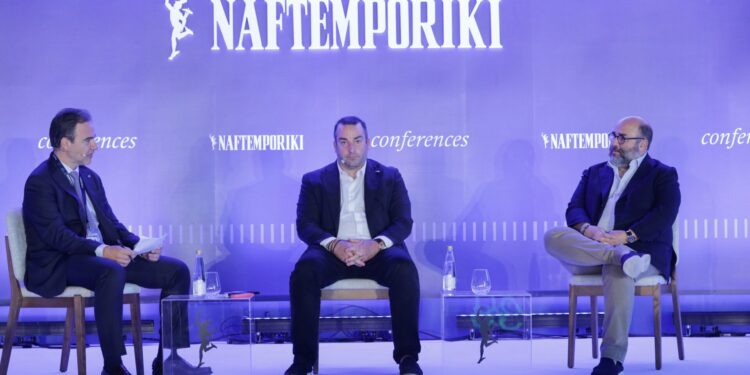The second panel of the 9th Naftemporiki Shipping Conference focused on international pressures affecting shipbuilding, pricing, and the strategic choices of shipping companies under the theme “The Future of Shipping: Shipbuilding & Financing – How are they progressing and on what terms?”
Haris Vafias: Transitioning from China
Haris Vafias, founder of Stealthgas Inc., Imperial Petroleum Inc., and C3iS Inc., discussed his company’s strategic pivot towards acquiring used Japanese cargo ships over the past two years, noting that Stealthgas has not engaged in shipbuilding in China since 2009. “We are wrapping up two decades away from China swiftly,” he remarked.
However, with the shipyards in Korea and Japan operating at full capacity, the landscape is evolving. “China is steadily surpassing its rivals in shipbuilding due to its flexibility, affordability, and swift delivery schedules. Currently, it stands as the only viable option,” he emphasized, expressing uncertainty over whether Trump’s recent decision to impose port fees on Chinese vessels will materialize.
When questioned about the role of the US and India in shipbuilding, he stated: “American shipyards struggle to match the prices set by China, Japan, and Korea. India, benefiting from lower labor costs, may gradually become a competitive player.”
Georgios Giouroukos: “Invest Boldly in Times of Fear”
Georgios Giouroukos, Founder of Technomar Shipping Inc., outlined an assertive investment strategy inspired by Warren Buffett’s principle: “Be aggressive when others are afraid.”
He explained, “When market prices hit rock bottom, I purchase ships in large volumes. Currently, ship prices—both new and used—are prohibitively high compared to potential earnings.”
On the quality of Chinese shipbuilding, he commented, “China will always produce vessels with lower quality compared to Japan and Korea. It’s like choosing a Hyundai over a BMW or an Audi. Enhancing a ship’s performance involves complex fluid dynamics calculations.”
Regarding India, he expressed doubts, saying: “While they are intelligent, they lack the work ethic seen in the Chinese, Japanese, or Koreans, who approach their work like soldiers. I doubt Indian shipyards will become highly competitive. Based on our experience with an Indian-built ship, it was incredibly challenging.”
Emerging Challenges: Costs, Green Transition, and ESG
The panel underscored the challenges facing shipping companies today, including rising shipbuilding costs, constrained choices in shipyards, and financing the energy transition. A significant portion of the discussion centered around ESG-linked loans and “green” financing, raising questions about whether selecting financing options is purely a matter of cost or if it reflects a more comprehensive strategy.

















